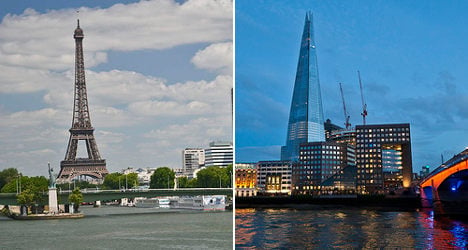France’s embassy in London has become embroiled in a diplomatic row after it was forced to defend the country against the latest round of French-bashing from the Anglo media, by taking a swipe at the UK.
The embassy in London was aggrieved by a piece by City AM journalist Allister Heath titled “France’s failed socialist experiment is turning into a tragedy” in which in, now age-old fashion, he predicts France’s economic demise and the exodus of all its bright stars.
But France’s London-based diplomats, still smarting from a recent provocative French-bashing article in Newsweek, decided to bash back, labelling Heath's article "an ideological mix of prejudice and error".
In an article on its website they list 10 reasons why City AM and Heath have got it completely wrong. But in doing so, they provoked the wrath of British politicians by criticizing the state of the NHS and the UK transport system.
“Years of under-investment forced the Blair government to allocate large sums of money to the NHS, and the current government has had to ring-fence funding for this ailing institution,” the article states.
“The French system, by comparison, which is also almost entirely free of charge, came top of 191 countries in the World Health Organization’s rankings for overall healthcare (source: World Health Organization). France also provides twice as many hospital beds per citizen as the UK.
“Similar success exists in infrastructure, from high-speed rail to energy. France has always sought to achieve greater efficiency and will continue to do so in spite of future budget cuts. Clearly, however, when you live in France – from health to infrastructure and from energy costs to transport – you get bang for your euro.”
The embassy also defended France’s tax system compared to that of the UK’s.
“The French and UK tax systems are based on different traditions. For one thing, the French tax system is fundamentally more redistributive,” the article writes.
To read the full comeback from the French embassy, click on the link below.
TEN reasons why France is not 'turning into a tragedy'
However the article, perhaps predictably, ended up provoking several British politicians to respond.
Health Secretary Jeremy Hunt was quoted in the Daily Telegraph as saying: "We may face stiff competition from the French on cheese & wine, but there's a reason the NHS makes us more proud to be British than any other institution."
And speaking to the same newspaper Dominic Raab, a Conservative MP, said: "The histrionic reaction of the French Ambassador only magnifies the increasing sense of Gallic insecurity commentators talk about.
"There's a reason London is now the sixth largest French city, and that's because an increasing number of French workers recognize their socialist experiment has failed. "
Heath was the latest journalist to twist the knife into France stating: "FRANCE is still France – and that, tragically, is why that great country and its wonderful people are doomed to decline further this year."
His piece echoed many sentiments expressed by Newsweek journalist Janine di Giovanni, who was lambasted by French media last week for her piece titled: "The Fall of France".





 Please whitelist us to continue reading.
Please whitelist us to continue reading.
Member comments